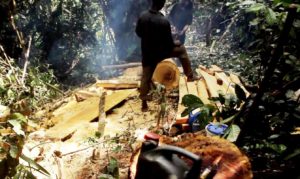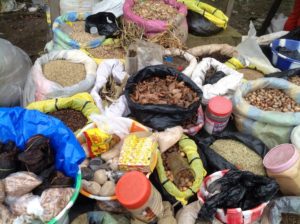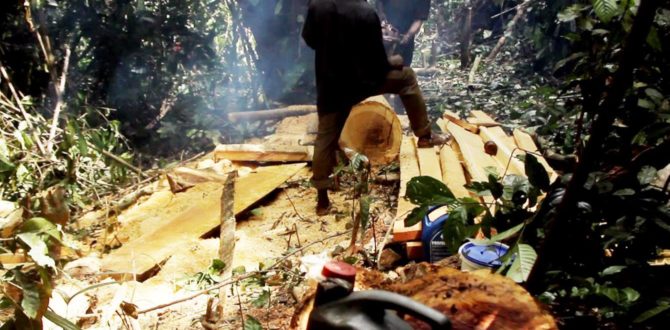Forests in Cameroon are a natural Automated Teller Machine (ATM) providing cash all year round through forest spices, nuts, fruits, tannins, herbs etc. to Cameroonians, most especially rural women. In fact, the market value of 45 (out of over 710) of such non-timber forest products is estimated at US$1.028 billion annually.

Unfortunately, this gold mine is being lost to deforestation. Averagely, about 30ha of forest are lost in Cameroon per hour. While many see this as inducing climate change, to forest dependent people , it is the loss of a permanent repository of wealth and long standing savings deposit from many generations.
Women, who are the main harvesters of these non-timber forest resources, currently make very little profit. This is because the quantities have greatly reduced (due to deforestation) and also because they are sold ‘raw’ or without any form of value added to them. Adding value/processing has the potential to increase profit margins by 150-400%. For example, Country onions (seeds of Afrostryrax lepidophyllus) are often sold partially dry at about 10XAF each (0.017 USD). if they are dried to 5% or less moisture level, crushed to powder and packaged, a pack (of 2 crushed seeds) would be sold at 100XAF (0.17USD). It would cost 35-65XAF (depending on type of packaging) to add this value. Also, with the powder sealed in the pack, it can be stored for a longer period.

A Cameroonian non-profit organization, Ecological Balance Cameroon, through a project dubbed Irvingia, (named after the bush mango; seeds of Irvingia spp, which is one of the most marketable forest products in Cameroon) is working on a local people centered, livelihood fueled forest conservation scheme that will train women to add value to/process forest products and hence generate substantial income. This would motivate these women and their families to protect the forest. The pilot phase of the project will commence inMarch 2019 in some communities around the Mbembe Forest Reserve in Ako, Donga Mantung, North West Region of Cameroon.
The Mbembe Forest Reserve was created in 1934 by virtue of its species richness and biological diversity including the Nigerian-Cameroon Chimpanzees, many species of monkeys (Cercopithecus spp), the Nile Crocodile (Crocodylus niloticus), Bell’s Hinged Back Tortoise (Kinixys belliana), Rock Python (Python sebae), Royal Python (Python regius), Graceful Chameleon (Chamaeleo gracilis), Nile Monitor lizard (Varanus niloticus), Forest monitor lizard (Varanus ornatus ), Bush baby (Potto sp) etc.
Through this project, women will be trained to process honey wax to face creams, herbs to medicine, forest fruits to jams and jelly, nuts to nut bars etc. Forests can best be conserved by people who live adjacent to it and if it contribute to their livelihood. The Irvingia project therefore sets out to make local people understand the wealth potential of forests through documentaries, exhibitions, theatre, forest expeditions, bird watching etc. Games will also be introduced, through which youths will learn about the forest in a fun way, practice what they learn (tree planting, cleaning water bodies, develop green business plans etc) and during inter-village competitions, pitch their products & ideas and win prizes.
Just like each of the over 3 million ATMs in the world runs on high level security and used cash is always replenished, so too does our natural ATMs’(the forest) need high security in the form of village level forest patrols & crackdowns and replenishment in reforestation activities which can be fueled through improved livelihoods. ATMs provide paid services, let’s pay our dues.
By Limbi Blessing Tata,
Botanist/Executive Director, Ecobalance Cameroon








Very good initiative you people should continue With that working spirit, is only God who can reward you guys.